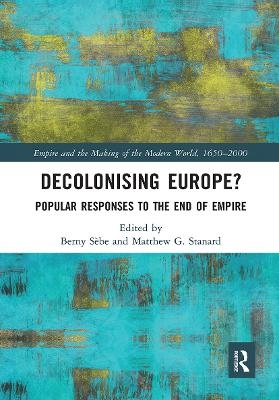
Decolonising Europe?
Routledge (Verlag)
978-1-032-23725-1 (ISBN)
Decolonising Europe? Popular Responses to the End of Empire offers a new paradigm to understand decolonisation in Europe by showing how it was fundamentally a fluid process of fluxes and refluxes involving not only transfers of populations, ideas, and sociocultural practices across continents but also complex intra-European dynamics at a time of political convergence following the Treaty of Rome. Decolonisation was neither a process of sudden, rapid changes to European cultures nor one of cultural inertia, but a development marked by fluidity, movement, and dynamism. Rather than being a static process where Europe’s (former) metropoles and their peoples ‘at home’ reacted to the end of empire ‘out there’, decolonisation translated into new realities for Europe’s cultures, societies, and politics as flows, ebbs, fluxes, and cultural refluxes reshaped both former colonies and former metropoles.
The volume’s contributors set out a carefully crafted panorama of decolonisation’s sequels in European popular culture by means of in-depth studies of specific cases and media, analysing the interwoven meaning, momentum, memory, material culture, and migration patterns of the end of empire across eight major European countries.
The revised meaning of ‘decolonisation’ that emerges will challenge scholars in several fields, and the panorama of new research in the book charts paths for new investigations. The question mark in the title asks not only how European cultures experienced the ‘end of empire’ but also the extent to which this is still a work in progress.
Berny Sèbe is Senior Lecturer in Colonial and Post-Colonial Studies at the University of Birmingham, UK Matthew G. Stanard is Professor of History at Berry College, USA
Introduction: Making Sense of the End of Empire: Fluxes and Flows in Decolonising Europe?
PART I
Meaning: Making Sense of Decolonisation
1. Magna Carta and the End of Empire
2. The End of Empire and the Four Nations
3. Reverberations of Decolonisation: British Approaches to Governance in Post-colonial Africa and the Rise of the ‘Strong Men’
PART II
Media: Words and Images of the End of Empire
4. The Semantics of Decolonisation: The Public Debate on the New Guinea Question in the Netherlands, 1950-62
5. Decolonisation and the Press: A Path to Pluralism in Franco’s Spain, ca. 1950-75
PART III
Memory: Recalling Empire in Post-imperial Worlds
6. Afterlives of Colonialism in the Everyday: Street Names and the (Un)Making of Imperial Debris
7. Passing the Point of No Return: Italy’s Regretted End of Empire and the Mogadishu Massacre of 1948
8. Oases of Imperial Nostalgia: British and French Desert Memories after Empire
9. Questioning Portugal’s Social Cohesion, and Preparing Post-imperial Memory: Returned Settlers (retornados) and Portuguese Society, 1975-80
PART IV
Material Culture: Tactile Rémanences
10. Ephemera and the Dynamics of Colonial Memory
11. Domestic Museums of Decolonisation? Objects, Colonial Officials, and the Afterlives of Empire in Britain
12. Decongolizing Europe? African Art and Post-Colony Belgium
PART V
Momentum: Decolonisation and its Aftermath
Afterword: Diverging Experiences of Decolonisation
| Erscheinungsdatum | 14.12.2021 |
|---|---|
| Reihe/Serie | Empire and the Making of the Modern World, 1650-2000 |
| Zusatzinfo | 19 Illustrations, black and white |
| Verlagsort | London |
| Sprache | englisch |
| Maße | 156 x 234 mm |
| Gewicht | 453 g |
| Themenwelt | Geisteswissenschaften ► Geschichte ► Allgemeine Geschichte |
| Geschichte ► Teilgebiete der Geschichte ► Wirtschaftsgeschichte | |
| ISBN-10 | 1-032-23725-2 / 1032237252 |
| ISBN-13 | 978-1-032-23725-1 / 9781032237251 |
| Zustand | Neuware |
| Haben Sie eine Frage zum Produkt? |
aus dem Bereich


